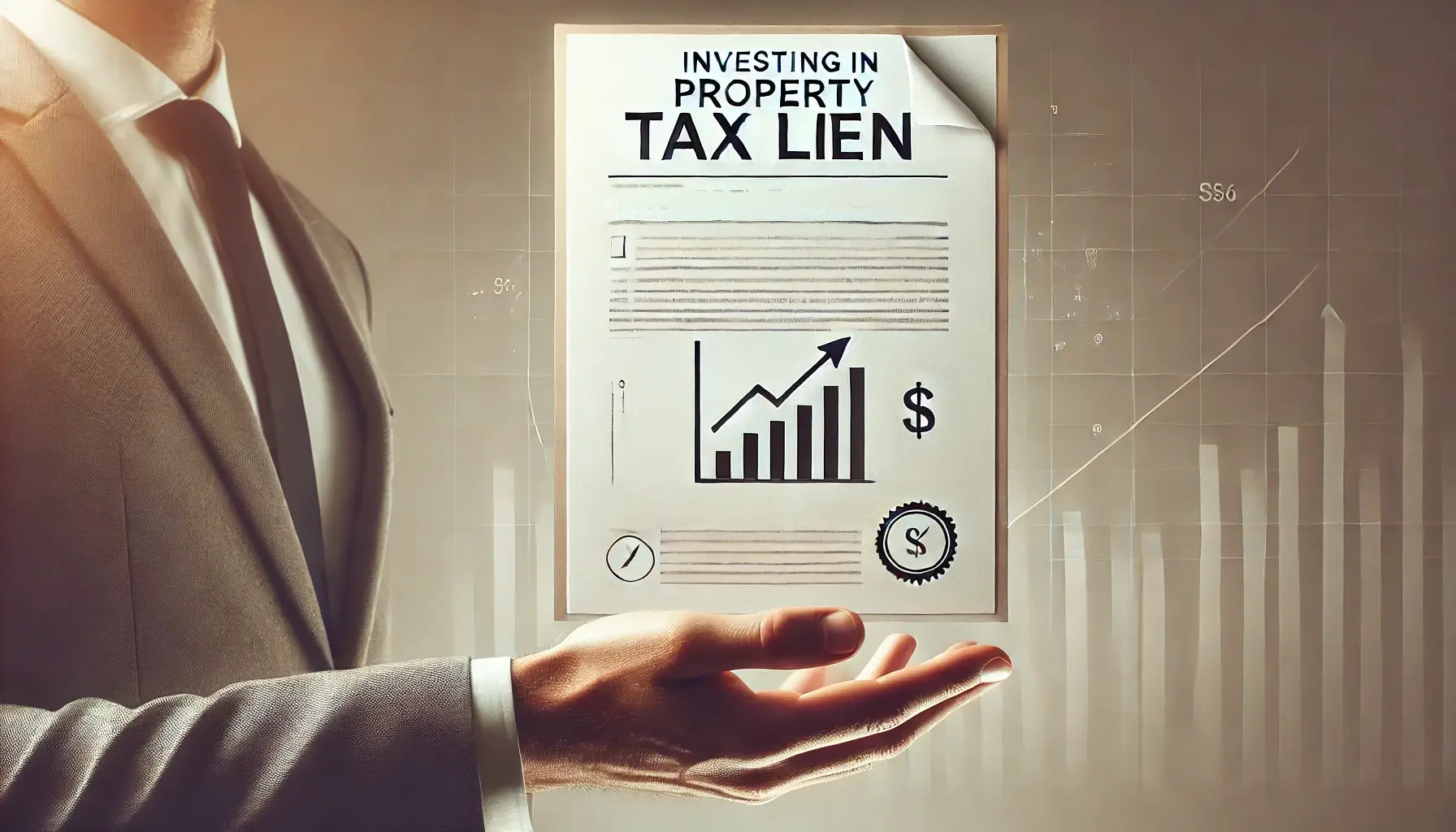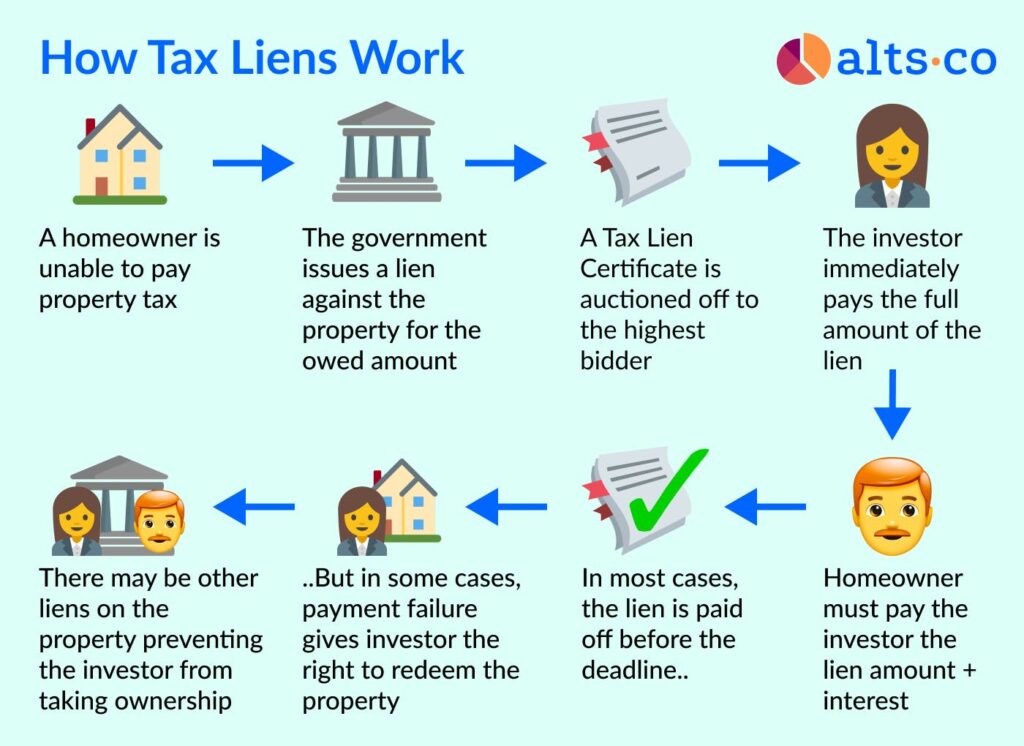All Categories
Featured
Table of Contents
Tax obligation lien investing can provide your profile direct exposure to realty all without needing to really own building. Specialists, nonetheless, claim the procedure is made complex and alert that novice investors can quickly obtain melted. Here's every little thing you require to find out about investing in a tax obligation lien certification, including just how it works and the dangers involved.
The notification typically comes prior to harsher actions, such as a tax levy, where the Irs (IRS) or local or local federal governments can in fact seize somebody's residential or commercial property to recoup the debt. A tax obligation lien certification is developed when a building proprietor has actually fallen short to pay their tax obligations and the city government concerns a tax obligation lien.
Tax lien certifications are commonly auctioned off to investors aiming to earnings. To recuperate the overdue tax obligation dollars, communities can then market the tax lien certificate to exclusive financiers, who deal with the tax obligation expense in exchange for the right to gather that money, plus rate of interest, from the homeowner when they at some point pay back their equilibrium.
Investing In Secured Tax Lien Certificates
enable for the transfer or project of delinquent property tax liens to the exclusive industry, according to the National Tax Lien Association, a nonprofit that represents federal governments, institutional tax obligation lien investors and servicers. Below's what the process looks like. Tax obligation lien capitalists need to bid for the certification in an auction, and just how that procedure functions relies on the certain municipality.
Contact tax officials in your area to ask just how those overdue taxes are collected. The town establishes a maximum price, and the bidder providing the most affordable interest price under that optimum wins the auction.
Other winning bids go to those that pay the greatest money quantity, or costs, above the lien amount. What happens following for capitalists isn't something that takes place on a stock market. The winning bidder has to pay the whole tax obligation expense, consisting of the overdue debt, interest and penalties. Then, the financier needs to wait up until the home proprietors repay their entire equilibrium unless they don't.
While some capitalists can be awarded, others may be captured in the crossfire of complex regulations and loopholes, which in the worst of conditions can lead to significant losses. From a mere profit standpoint, the majority of investors make their cash based on the tax lien's rates of interest. Rates of interest differ and rely on the jurisdiction or the state.
Profits, nevertheless, don't constantly total up to yields that high throughout the bidding process. In the long run, many tax obligation liens bought at public auction are cost prices in between 3 percent and 7 percent across the country, according to Brad Westover, executive director of the National Tax Lien Association. Prior to retiring, Richard Rampell, previously the chief executive of Rampell & Rampell, an accountancy company in Hand Coastline, Florida, experienced this direct.
Tax Lien Redemption Period
After that large institutional financiers, including banks, hedge funds and pension funds, went after those higher yields in public auctions around the nation. The bigger capitalists helped bid down passion prices, so Rampell's team wasn't making significant cash any longer on liens.
Yet that rarely happens: The tax obligations are usually paid before the redemption date. Liens likewise are first in line for payment, even prior to mortgages. Nevertheless, tax obligation liens have an expiry day, and a lienholder's right to confiscate on the home or to gather their financial investment runs out at the same time as the lien.
"Often it's 6 months after the redemption period," Musa says. "Don't believe you can simply purchase and forget about it." Private investors that are taking into consideration investments in tax liens should, over all, do their research. Experts recommend preventing residential properties with ecological damage, such as one where a gasoline station disposed harmful product.
Tax Lien Investing Scam
"You must really recognize what you're purchasing," states Richard Zimmerman, a partner at Berdon LLP, a bookkeeping company in New York City. "Know what the building is, the area and worths, so you do not acquire a lien that you will not be able to collect." Prospective capitalists need to also have a look at the residential or commercial property and all liens versus it, as well as recent tax sales and sale rates of similar buildings.
"People obtain a listing of residential or commercial properties and do their due persistance weeks prior to a sale," Musa claims. "Half the residential or commercial properties on the checklist may be gone because the tax obligations get paid.
Tax Lien Investing Colorado

Westover claims 80 percent of tax lien certificates are offered to members of the NTLA, and the firm can often match up NTLA members with the right institutional financiers. That could make managing the procedure much easier, specifically for a beginner. While tax lien financial investments can provide a generous return, recognize the fine print, information and guidelines.
"However it's complicated. You need to comprehend the details." Bankrate's added to an update of this story.
Real estate tax liens are an investment niche that is overlooked by the majority of financiers. Buying tax liens can be a profitable though reasonably risky company for those that are experienced concerning realty. When individuals or organizations stop working to pay their real estate tax, the districts or various other government bodies that are owed those taxes put liens versus the residential or commercial properties.
Is Tax Lien Investing Profitable
These cases on security are also exchanged among financiers who intend to create above-average returns. Via this procedure, the town obtains its taxes and the capitalist obtains the right to gather the amount due plus rate of interest from the debtor. The process hardly ever ends with the capitalist taking possession of the residential property.
Liens are cost auctions that in some cases include bidding process wars. If you require to seize, there might be various other liens against the home that keep you from occupying. If you obtain the building, there might be unpredicted expenditures such as repairs and even forcing out the present owners. You can also invest indirectly using building lien funds.
It properly locks up the residential or commercial property and avoids its sale until the proprietor pays the tax obligations owed or the residential property is confiscated by the lender. When a landowner or home owner stops working to pay the tax obligations on their residential property, the city or county in which the home is situated has the authority to put a lien on the residential or commercial property.
Residential or commercial property with a lien affixed to it can not be sold or re-financed up until the taxes are paid and the lien is gotten rid of. When a lien is released, a tax obligation lien certification is developed by the community that reflects the quantity owed on the building plus any kind of passion or fines due.

It's approximated that an additional $328 billion of real estate tax was assessed throughout the U.S. in 2021. The fad continues. Taxes on single-family homes were approximated to climb approximately 3.6% in 2022, to a total amount of $339.8 billion, and by 6.9% in 2023, to $363.3 billion. It's tough to assess across the country building tax lien numbers.
Latest Posts
Investors Only
Investing In Tax Liens
What are the benefits of Accredited Investor Real Estate Partnerships for accredited investors?